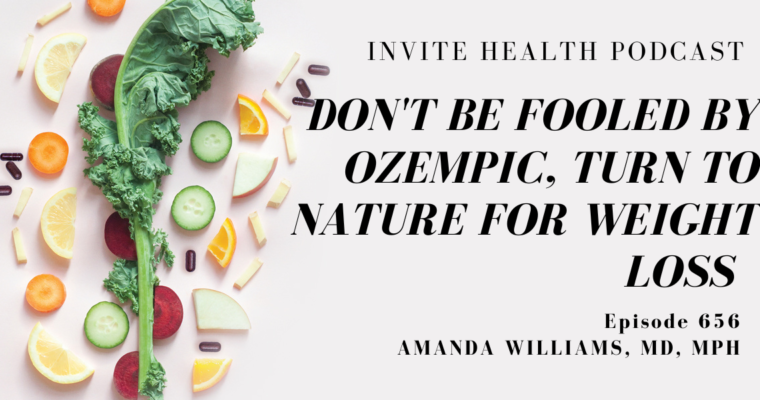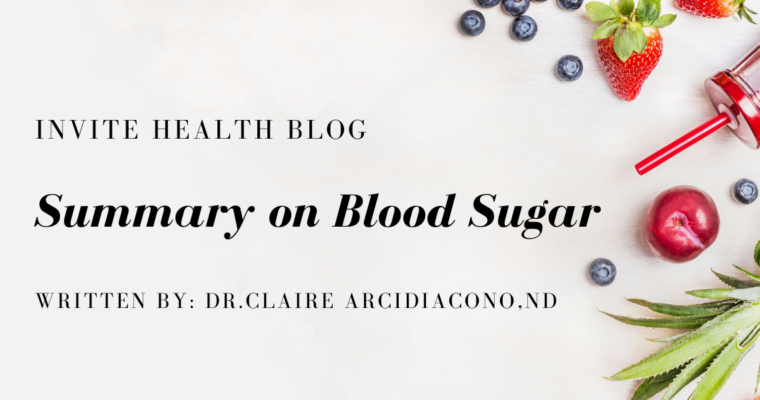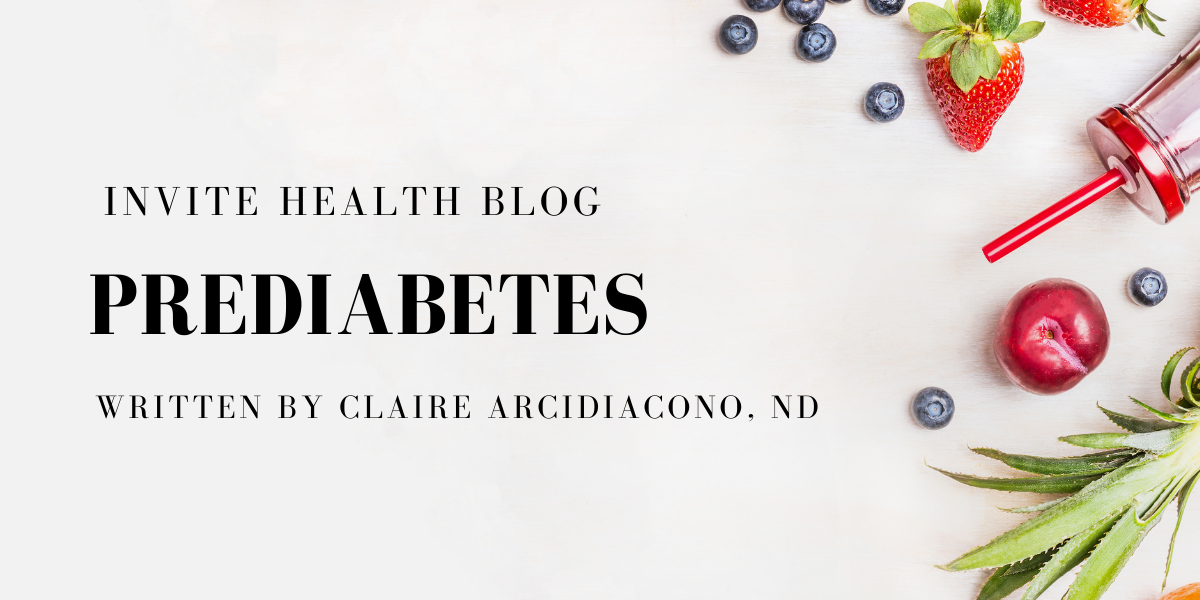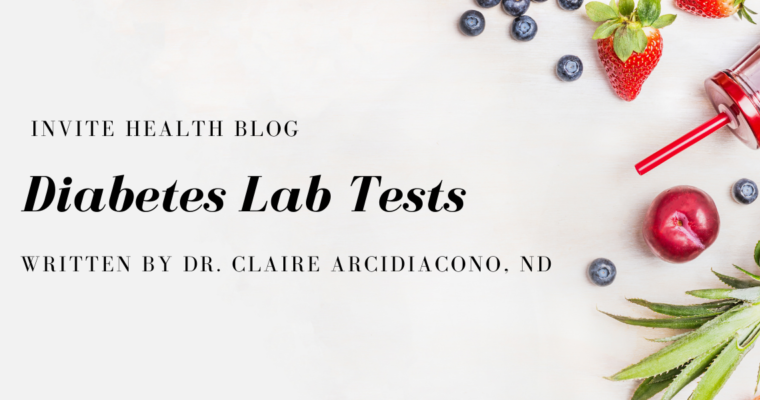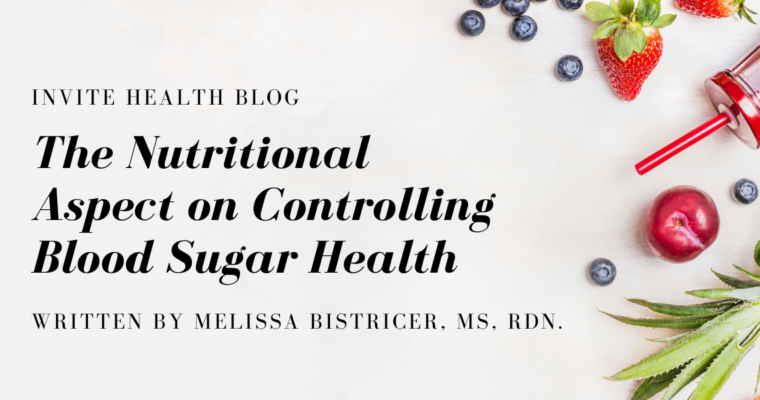Written by: Dr. Claire Arcidiacono, ND
For further questions or concerns email me at carcidiacono@invitehealth.com†

Last blog I wrote about diabetes type 1. Today we will be talking about the interesting topic of prediabetes. From a holistic point of view, prediabetes is very interesting. It is literally the last stop between being healthy and becoming a full blown diabetic! Prediabetes is basically high blood sugar that is higher than is considered healthy, but is lower than is considered diabetic. Prediabetes can progress to full diabetes if changes to lifestyle and diet aren’t done. Certain supplements can help with this.†
HEALTHY VS PREDIABETES
What exactly is the cut off for “healthy” vs prediabetes? An A1C between 5.7 and 6.4 is typically considered to be prediabetes. A fasting blood sugar between 100 and 125, is usually associated with prediabetes. However, even if blood sugar is in that range, it is recommended to get a follow up A1C. (1) Now as I’m sure you notice 5.7 – 6.4 is a rather large range. In my clinical experience I have seen doctors diagnose prediabetes with an A1C of as low as 5.5. This is why it is always a good idea to get a copy of your blood work to have on hand when you call or come in.†
What are the signs that you may have prediabetes? Well basically they are very similar if not identical to diabetes. One symptom of prediabetes is called Acanthosis Nigricans, which is a darkening of the skin usually in the neck. Other areas that can be affected include the armpits, and groin. (2) Other symptoms include increased thirst, urination and hunger. Fatigue is very common. There may be blurry vision. As the prediabetes gets worse symptoms such as numbness and tingling in the hands and feet can occur. In addition to these symptoms there may be frequent infections as well as a decrease in the ability to heal. (3)†
RISK FACTORS
Now what are the risk factors for prediabetes? Well as I’ve just said prediabetes is very similar to diabetes type 2 (we will be talking about this next week!). In diabetes type 2 there is usually enough insulin however your body is no longer sensitive to it. In prediabetes, this process is at the beginning stage, in other words the cells that normally respond to insulin to uptake glucose or sugar are resistant to this process, so the glucose stays in the blood stream. What are the risk factors for insulin resistance?†
→Number one is hands down, diet, lack of activity and unhealthy lifestyle (example smoking). I’ve linked those together because normally those with one unhealthy lifestyle (smoking for example) are usually sedentary and have a standard American diet.†
→The next two important risk factors are weight and waist size. Those over 45 years old are also at an increased risk. While more research needs to be done, certain ethnicity also appear to have a higher risk.†
→Women with PCOS are also at an increased risk.†
→Those with obstructive sleep apnea seem to have an increased risk.†
→Lastly those with metabolic syndrome are at an increased risk for prediabetes. (4)†
ICYMI: BLOOD SUGAR AND KIDNEY SUPPORT – INVITE HEALTH PODCAST, EPISODE 519>>LISTEN NOW!
Prediabetes can progress to diabetes or stay at the level of prediabetes. While avoiding diabetes is a great first step, it is important to aggressively work with prediabetes since even prediabetes has been linked to long term damage to the heart, blood vessels, and even the kidneys. Long term prediabetes has been linked to such things as high blood pressure, high cholesterol, heart disease including heart attack and strokes. There can even be damage to the nerves as well as the eyes.† (5)
Prediabetes is one place where natural medicine and complementary medicine truly shine! With prediabetes I am proud to say we have many tools in our holistic tool box! †
DIET & LIFESTYLE
Diet and Exercise are 2 of the most important aspects to working with prediabetes.†
Studies have found an association between a Mediterranean diet and better control over your blood sugar! †(6)
Reducing unhealthy lifestyle choices such as smoking have also been found to have a positive effect on blood sugar †(7)
Reducing stress also has been found to have positive affect on blood sugar.† (8)
ICYMI: THE PHYSIOLOGY OF DIABETES>>READ NOW!
SUPPLEMENTS TO SUPPORT HEALTHY BLOOD SUGAR LEVELS
Chromium, Zinc and Magnesium have been correlated with better blood sugar control. Studies show that those with low levels of these nutrients have less stable or even poorly controlled blood sugar. (9) Please see Invitehealth for all of our options containing these fantastic nutrients!†
Gymnema is one of the herbal remedies that studies have found to be anti- diabetic and to help with normalizing blood sugar. (10) Please see Invite’s Gluco Hx for this amazing herb!†
Bitter melon has been found in studies as well as through traditional medicine to be very helpful at regulating blood sugar levels. (11) Please see Invite’s Gluco Hx for this amazing herb!†
Fenugreek in studies has been found to regulate blood sugar with better results than the controls (12). Please see Invite’s Gluco Hx!†
Cinnamon has been found in studies to help lower blood sugar that spikes after eating. (13). Please seen Invite’s C-Betics!†
Biotin has been found to have an essential role in regulating blood sugar (14). Please see Invite’s biotin or Vitamin H!†
SOURCES
1.https://www.cdc.gov/diabetes/basics/getting-tested.html
2.https://www.aad.org/public/diseases/a-z/diabetes-warning-signs
3.https://www.mayoclinic.org/diseases-conditions/prediabetes/symptoms-causes/syc-20355278
4.Mahat RK, et al. Health risks and interventions in prediabetes: A review. Diabetes & Metabolic Syndrome: Clinical Research & Reviews. 2019; doi:0.1016/j.dsx.2019.07.041.
5.Type 2 diabetes. National Institute of Diabetes and Digestive and Kidney Diseases. https://www.niddk.nih.gov/health-information/diabetes/overview/what-is-diabetes/type-2-diabetes. Accessed Oct. 18, 2021.
6.https://www.ncbi.nlm.nih.gov/pmc/articles/PMC7468821/
7.Cigarette smoking: A risk factor for type 2 diabetes. U.S. Food and Drug Administration. https://www.fda.gov/tobacco-products/health-effects-tobacco-use/cigarette-smoking-risk-factor-type-2-diabetes. Accessed Oct. 20, 2021.
8.https://www.diabetes.org.uk/guide-to-diabetes/emotions/stress#:~:text=If%20stress%20doesn’t%20go,to%20affect%20your%20emotional%20health.
9.https://pubmed.ncbi.nlm.nih.gov/26406393/
10.https://www.ncbi.nlm.nih.gov/pmc/articles/PMC3912882/
11.https://www.ncbi.nlm.nih.gov/pmc/articles/PMC4027280/
12.https://www.ncbi.nlm.nih.gov/pmc/articles/PMC4591578/
13.https://www.ncbi.nlm.nih.gov/pmc/articles/PMC6425402/
14.https://www.ncbi.nlm.nih.gov/pmc/articles/PMC3679599/


